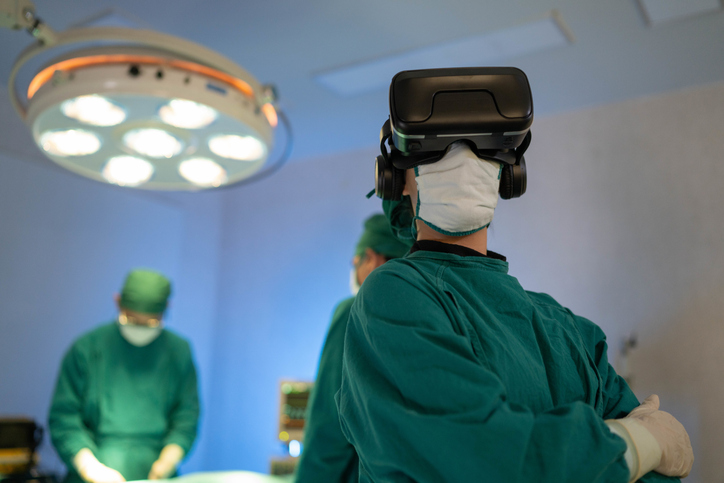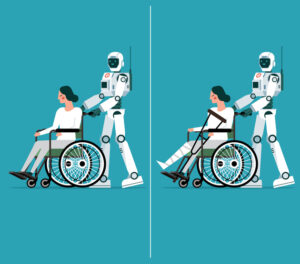 The healthcare community and the profession of nursing were in a tough spot even before the COVID-19 pandemic. Long-term trends have increased demands on nurses even as they have squeezed the training pipeline:
The healthcare community and the profession of nursing were in a tough spot even before the COVID-19 pandemic. Long-term trends have increased demands on nurses even as they have squeezed the training pipeline:
- An aging population comes with greater medical demands, particularly in skilled nursing fields
- A shortage of active nursing instructors lowers the number of nurses who can be trained each year
- Increasing immigration restrictions clamps off highly trained nurses from outside the country
- Newer and more technical specializations and treatments increase the training requirements for nurses and siphon off nurses from other basic duties
The pandemic was just the last straw. The stress piled up to the point where, in 2023, almost a third of currently working nurses in the U.S. said they were likely to leave the profession.
But there is a ray of sunshine in the prognosis for American nursing. And that comes right from one of the pressure points on the system: even as medical technology becomes more complex; the rise of artificial intelligence is coming to help nurses work more efficiently and effectively.
How Technology in Nursing Has Always Placed Nurses on the Front Lines of Change
Nurses have ended up being front and center in most technological innovation in healthcare. When new Health Information Systems hit the wards, it’s nurses who are left to figure out how to enter lab tests and retrieve patient notes. When a new brand of automated IV pump comes in, nurses are reading the manuals and figuring out how to hook it up.
New technology in nursing ultimately falls to front-line nurses to figure out. AI will be the same.
So when AI is introduced to healthcare systems, it’s almost certainly going to fall to nurses to be the professionals who figure out how to make the most of it. Nurses role in system development life cycle considerations makes them the experts by default.
AI in Nursing Informatics and Technology Is Already Here
 In fact, that new technology has already been showing up in hospitals, clinics, and nursing research facilities wearing the clothes of data science.
In fact, that new technology has already been showing up in hospitals, clinics, and nursing research facilities wearing the clothes of data science.
Data science has transformed health care through an ability to look deeply in large amounts of data to identify trends and highlights that humans wouldn’t be able to pick out from the scrum. One of the key techniques that has made that possible is machine learning. ML is a method of allowing computers to learn as they go, and it’s a centerpiece in new generative artificial intelligence as well.
The future of nursing informatics is now with advanced machine learning already deployed through data science teams looking at nurse documentation.
Nurses can expect to see more and smarter systems in healthcare informatics, developing capabilities that lead to:
- Faster and more accurate patient diagnostics
- Better incorporation of holistic lifestyle data with vital statistics and medical testing
- New treatments and more individually tailored care plans for patients
Nurse AI Will Assist in Both Documentation and Care
 Paperwork is a constant feature of nursing jobs. Even with the advent of Electronic Health Records (EHR), nurses spend a lot of time reviewing and updating medical charts.
Paperwork is a constant feature of nursing jobs. Even with the advent of Electronic Health Records (EHR), nurses spend a lot of time reviewing and updating medical charts.
AI can help take the load off here, too. Smart systems tied to patient monitors can record and analyze vitals without any human intervention. Critical billing data can be assembled, documented, and submitted without a nurse taking the time to put it together.
And AI will help reduce the amount of time that nurses need to review charts and other data, too. AI-powered search can make what used to be sustained combat with clunky and esoteric HIS search boxes into a simple plain-language request. The AI will be smart enough to understand the question, ask follow-ups if it needs clarification, and then instantly sort through stacks of data to get the right information back almost immediately.
Artificial Intelligence in Nursing Will Keep an Eye on Patients So Nurses Don’t Have To
 AI can also keep an eye on both patient status and progress with more insight than simple vitals. In radiology, computer vision improvements in image assessment have been trained to detect subtle signs of disease on par with the best human radiologists. The ability of AI to tease out trends in data will give it more of a role in patient oversight and take some of the load off of nurses.
AI can also keep an eye on both patient status and progress with more insight than simple vitals. In radiology, computer vision improvements in image assessment have been trained to detect subtle signs of disease on par with the best human radiologists. The ability of AI to tease out trends in data will give it more of a role in patient oversight and take some of the load off of nurses.
AI doesn’t get tired and doesn’t have limitations about what it’s looking for. In a way, it has an ability similar to humans to simply sense that something is not quite right, and to call for help. This is a sixth sense that nurses have come to rely on that may be passed on to machines… and take the load off already strained staff nurses.
This increased oversight can also come at the same time as greater patient independence. Putting AI together with the Internet of Things (IoT) will deliver smart, small, wearable monitors that can keep nurses in the loop no matter where the patient is. That can reduce the need for staffing on the ward and free up beds, while also allowing patients to stay in more comfortable surroundings at home or with family—while still maintaining high quality of care.
Nursing Quality Improvement Can Come With New AI Tools
 Just as AI can keep an eye on patients with a more holistic perspective on wellness and welfare, it will also serve as a watch on areas of improvement for nurses themselves. Smart reminders will help nurses keep on top of their own workload. AI can call out missed drug administrations or help catch mix-ups in dosage.
Just as AI can keep an eye on patients with a more holistic perspective on wellness and welfare, it will also serve as a watch on areas of improvement for nurses themselves. Smart reminders will help nurses keep on top of their own workload. AI can call out missed drug administrations or help catch mix-ups in dosage.
That will make patients safer and nurses more efficient. Clinical decision support tools will be available to work collaboratively with nurses and other clinicians to help make evidence-based decisions in individual patient care for more effective treatment, as well.
AI, particularly the newest kinds of natural language processing AI, can also help nurses better connect with their patients. Translation is a strength for NLP algorithms and will allow more fluid and instant communication between nurses and patients who don’t otherwise share a language.
Will AI Nurse Robots Take Over?
 Something that comes to mind for almost everyone hearing the phrase artificial intelligence is smart robots. While today’s AI has largely been focused on the language and decision-making abilities of programs, there are also big improvements coming in autonomous devices that can assist in nursing.
Something that comes to mind for almost everyone hearing the phrase artificial intelligence is smart robots. While today’s AI has largely been focused on the language and decision-making abilities of programs, there are also big improvements coming in autonomous devices that can assist in nursing.
Robotics in nursing today isn’t really about changing catheters or adjusting ECG leads, though. There are already a number of different kinds of robots at work in the healthcare field, handling everything from the exotic task of fully remote surgical intervention to more mundane systems that cart around tubs of saline and 4x4s to restock supply rooms.
AI nurse robots probably won’t be a thing anytime soon, but robots in general will help with challenges nurses face every day.
AI will enhance the capabilities of all those systems to perform faster, more effectively, and with less human oversight. Supply robots, for example, may be taught how to stock shelves instead of merely delivering supplies to the right room. They could be connected with AI-powered inventory systems that will place orders and analyze utilization trends to ensure that no one ever runs out of needed supplies.
Ethics Challenges in AI and Nursing
 Healthcare is a field where ethics are on the minds of practitioners every single day. Among all healthcare professions, nursing may be most firmly rooted in that tradition. Every decision that nurses make is rooted in concern for their patients and fighting for equity and access to care. The holistic model that nursing is built around is almost entirely ethics-oriented, viewing patients as a whole person and not just a collection of diagnostic and billing codes.
Healthcare is a field where ethics are on the minds of practitioners every single day. Among all healthcare professions, nursing may be most firmly rooted in that tradition. Every decision that nurses make is rooted in concern for their patients and fighting for equity and access to care. The holistic model that nursing is built around is almost entirely ethics-oriented, viewing patients as a whole person and not just a collection of diagnostic and billing codes.
When AI overrules the nurses, who will decide?
There’s a risk, with AI deeply woven into clinical decision support tools, that it will offer guidance that is different from what nursing judgement and practice call for. Purely medical decision-making may not consider all the other variables in play.
So nurses will also bear the brunt of holding AI to high ethical and privacy standards in healthcare.
Fortunately, this is a key piece of nursing education today. It reflects a longstanding role in the nursing community for patient advocacy. Holistic perspectives on patients as members of communities, cultures, and traditions that may be outside the norms that AI are trained on will help protect care across boundaries.
Nursing Documentation Creates Big Privacy Concerns for AI Nursing
 The large amounts of data involved in modern artificial intelligence training is a real cause for privacy concerns in nursing AI. Already, generative AI systems have been caught disclosing what should have been protected information from their training data.
The large amounts of data involved in modern artificial intelligence training is a real cause for privacy concerns in nursing AI. Already, generative AI systems have been caught disclosing what should have been protected information from their training data.
While privacy is always an important value, in healthcare it’s enshrined in the Health Insurance Portability and Accountability Act (HIPAA). There are real teeth behind the law’s requirements to guard sensitive health information. It’s not clear even how much health information can be legally used to train AI tools for nurses. And without that training data, AI is effectively useless.
There are also genuine concerns over bias in AI decision support tools. History has shown that certain groups are likely to be marginalized and receive substandard care in the American health system. That means that the training data AI is built on will be littered with disparate outcomes unless it is very carefully reviewed first. Even apparently innocuous trends can lead to bias.
This is already seen even in less complex algorithms. A 2007 algorithm designed to evaluate the potential for women to deliver through vaginal birth after having a previous C-section was found to incorrectly predict that Black and Hispanic women were in more danger than white women. That lead to more C-sections performed on Black and Hispanic patients who didn’t need them, at greater cost and risk.
The Future of Artificial Intelligence in Nursing Practice
 Nurses are the unsung heroes of the healthcare system. Very little happens in any hospital, clinic, or research facility that they don’t have unique insight into.
Nurses are the unsung heroes of the healthcare system. Very little happens in any hospital, clinic, or research facility that they don’t have unique insight into.
With that role comes tremendous influence in the way that AI tools will come into nursing and healthcare in general. The inclusion of nurses in the systems development life cycle is an old tradition in medicine. It offers them a lot of influence in what tools and technology are used in nursing. That will extend to artificial intelligence, too.
The benefits of nursing informatics make it all but a given that one of the initial impacts of AI on nursing practice will be in quality improvement. Putting together stats and spotting trends in outcomes fits right in with the development of nursing as evidence-based practice.
On the other side of that will be the influence of AI and demographics on staffing. When more technology comes into the ward, it’s always with a view toward reducing labor requirements. Just as numbers of available professional nurses are diminishing, AI nursing tools will make a push to replace those empty slots.
In some cases, that’s probably going to be the wrong choice.
But on the whole, like other nursing technology innovations, nursing and AI will come together to the advantage of both. New technology in nursing has always eventually worked out better for both nurses and patients. Artificial intelligence has the potential to go even further and help even more.